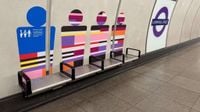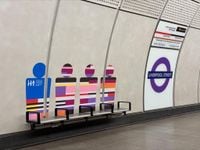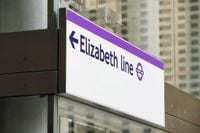Transport for London (TfL) is taking action to enhance the cleanliness of the Elizabeth line, which has recently become notorious for unsightly grease and dirt marks on platform walls. In a bold move to tackle the issue of so-called ‘ghost marks,’ TfL has installed colorful, moquette-inspired coverings behind benches at various stations, starting with Bond Street, Farringdon, and Liverpool Street.
The unconventional coverings are designed not just to provide an aesthetic lift but also to signify priority seating at the ends of the benches. "The Elizabeth line has had a transformational effect since opening, providing new, accessible journey options for customers, including at new central London stations. These stylish new moquette-inspired designs will enhance the customer experience by protecting the areas behind the seats," said Howard Smith, director of the Elizabeth line, in comments made to the BBC on March 21, 2025.
The origin of these ghost marks dates back to the line's launch in May 2022, which has since blossomed into a vital transit service across London. However, approximately 18 months post-opening, the stark white walls started to show an unwelcome trend of dark patches, a result of dirty backs and backpacks brushing against the walls, leaving behind a residue that raised concerns among passengers and officials alike.
The situation was brought to light when Caroline Pidgeon, a member of the London Assembly, questioned Mayor of London, Sir Sadiq Khan, at the end of 2023 about the measures in place to keep the station walls clean. His response included reassurances that TfL was maintaining a rigorous cleaning program across all stations. Nonetheless, he acknowledged the need to address the unsightly marks more effectively. "A rigorous cleaning programme is maintained at all of TfL’s stations to ensure a clean and safe environment for customers. However, TfL is exploring new ways to clean the walls behind seating at some of its Elizabeth line stations to try to remove any marks and protect the walls in future," Khan emphasized.
In 2024, TfL initiated trials to discover viable solutions for the recurring problem. After assessing various options, the decision was made to implement vinyl coverings inspired by the unique purple upholstery found on Elizabeth line trains. This move not only aims at covering the existing marks but also at preventing new ones from spoiling the freshly designed interiors.
So far, the stylish new moquette designs have also been rolled out on platforms at Tottenham Court Road, in addition to the others. The strategy marks a significant pivot in TfL's approach to user experience, turning a potential deterrent into a distinctive feature of the Elizabeth line platforms.
Although the Elizabeth line has quickly gained popularity–becoming the UK’s busiest railway service–its journey has not been free of challenges. As recent reports illustrate, five Elizabeth line stops have appeared on a list of London’s worst ten for canceled trains over the past year. Notably, Acton Main Line station recorded a cancellation rate of 8.72 percent, raising eyebrows among regular commuters.
As the railway network continues to evolve, the efforts to maintain a clean, welcoming environment reflect TfL's commitment to passenger satisfaction. By innovating in areas such as station cleanliness and functionality, Transport for London seeks to ensure that the Elizabeth line remains not only a reliable travel option but also an aesthetically pleasing one.
In response to these new installations, Londoners are expected to welcome the practical yet stylish changes, and more importantly, hope that the developments will encourage a respect for the cleanliness of these vital transport hubs. Indeed, the Elizabeth line may have started as merely a transit project, but it is actively transforming the traveler’s experience in London.
With the installation of these coverings, TfL is taking proactive steps to combat the grim realities of urban transit, establishing a new standard for cleanliness in public transport in the heart of London.






